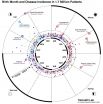(Press-News.org) Sydney, Australia: Patterns of peak rainfall during storms will intensify as the climate changes and temperatures warm, leading to increased flash flood risks in Australia's urban catchments, new UNSW Australia research suggests.
Civil engineers from the UNSW Water Research Centre have analysed close to 40,000 storms across Australia spanning 30 years and have found warming temperatures are dramatically disrupting rainfall patterns, even within storm events.
Essentially, the most intense downpours are getting more extreme at warmer temperatures, dumping larger volumes of water over less time, while the least intense periods of precipitation are getting weaker. If this trend continues with future warming, the risk of flooding due to short-term extreme bursts of rainfall could increase even if the overall volume of rain during storms remains the same. The findings were published today in the journal Nature Geoscience.
"These more intense patterns are leading to more destructive storms, which can significantly influence the severity of flood flows," says lead author and PhD candidate Conrad Wasko, from the UNSW School of Civil and Environmental Engineering. "The climate zones we studied in Australia are representative of most global climates, so it's very likely these same trends will be observed around the world."
Previous studies have looked at rainfall volumes over the total duration of storms, but this latest UNSW study is the first to look at temporal rainfall patterns within storms. Australian Bureau of Meteorology data from 79 locations across the country were used instead of computer simulations.
"Our results were consistent across all the climate zones in Australia, regardless of season or storm type, without exception," said co-author and UNSW engineer, Professor Ashish Sharma. "This was an unexpected finding, and it supports our hypothesis that increasing temperatures are changing rainfall patterns."
"It means that most people in Australia can expect to see intensification in the magnitude of flash flooding in smaller catchments, particularly in urban or residential areas," says Professor Sharma.
The paper quantifies this increase for a range of Australian cities representing different climates and finds that for a five degree Celsius temperature rise the flood peaks could increase by an average of 5% to 20% for a typical medium-sized catchment.
The increase in flood peaks are estimated to be about 19% for Hobart, 12% for Sydney, 10% for Perth, and 45% in Darwin, which has a tropical climate and a markedly different storm pattern than the other cities.
"The fact that these increases represent changes only in the intensity of rainfall within storms, and not the total volume of rain - which will also increase as temperatures warm - is concerning," says Professor Sharma. "These results highlight the need for local councils to think about redesigning sewage and road infrastructure, and updating guidelines about where it's safe to build homes."
The team analysed the 500 largest storms by rainfall volume from each of the 79 locations. These storms were divided into five equal time-periods to determine when rainfall was heaviest.
Wasko says the next step is to incorporate the findings into a model that can predict rainfall in future climates. "That's the big caveat," he says. "Is our present-day climate indicative of potential changes to future climates? Or will we begin to see entirely new weather systems emerging as climates change?"
INFORMATION:
Media Contact: Myles Gough, UNSW Media Office, +61 4 9116 2717, myles.gough@gmail.com
Professor Ashish Sharma, a.sharma@unsw.edu.au | Conrad Wasko, conrad.wasko@unsw.edu.au
New York, NY, June 8, 2015 - Professional physician associations consider certain routine tests before elective surgery to be of low value and high cost, and have sought to discourage their utilization. Nonetheless, a new national study by researchers at NYU Langone Medical Center finds that despite these peer-reviewed recommendations, no significant changes have occurred over a 14-year period in the rates of several kinds of these pre-operative tests.
The results are to publish online on June 8, 2015 in JAMA Internal Medicine.
"Our findings suggest that professional ...
Both statin and nonstatin cholesterol-lowering drugs were associated with memory loss in the first 30 days after patients started taking the medications when compared with nonusers, but researchers suggest the association may have resulted because patients using the medications may have more contact with their physicians and therefore be more likely to detect any memory loss, according to an article published online by JAMA Internal Medicine.
Acute memory loss associated with the use of statins has been described in case reports and case studies, as well as in some studies, ...
Researchers at University of Helsinki, Finland, and Karolinska Institutet, Sweden, discovered previously uncharacterized mutational patterns in the human regulatory genome, especially in gastrointestinal tract cancers. The study was published in Nature Genetics.
The research led by Academy Professor Lauri Aaltonen and Professor Jussi Taipale, was based on study of more than two hundred whole genomes of colorectal cancer samples. The scientists detected a distinct accumulation of mutations specifically at sites where the proteins CTCF and cohesin bind the DNA.
Both ...
It's a notion that might be pulled from the pages of science-fiction novel - electronic devices that can be injected directly into the brain, or other body parts, and treat everything from neurodegenerative disorders to paralysis.
It sounds unlikely, until you visit Charles Lieber's lab.
A team of international researchers, led by Lieber, the Mark Hyman, Jr. Professor of Chemistry, an international team of researchers developed a method for fabricating nano-scale electronic scaffolds that can be injected via syringe. Once connected to electronic devices, the scaffolds ...
Genes linked to creativity could increase the risk of developing schizophrenia and bipolar disorder, according to new research carried out by researchers at the Institute of Psychiatry, Psychology & Neuroscience (IoPPN) at King's College London.
Previous studies have identified a link between creativity and psychiatric disorders such as bipolar disorder, but it has remained unclear whether this association is due to common genes. Published today in Nature Neuroscience, this new study lends support to the direct influence on creativity of genes found in people with schizophrenia ...
ITHACA, N.Y. - If you want people to choose healthier foods, emphasize the positive, says a new Cornell University study.
Published in the American Journal of Agricultural Economics, the Cornell Food and Brand Lab study showed that when it comes to nutrition education, dos work a lot better than don'ts. This is especially important when determining policies that encourage healthy eating.
Media note: A short video explaining the research, as well as an informational graphic and additional details about this research can be found at, http://foodpsychology.cornell.edu/OP/Hidden_Costs ...
This news release is available in French. A new joint study by researchers at the Montreal Neurological Institute and the Centre for the Study of Democratic Citizenship, both at McGill University, has cast some light on the brain mechanisms that support people's voting decisions. Evidence in the study shows that a part of the brain called the lateral orbitofrontal cortex (LOFC) must function properly if voters are to make choices that combine different sources of information about the candidates. The study found that damage to the LOFC leads people to base their vote ...
A new study gives insight into the mental health of children and teens with Down syndrome and the behavioral medications that medical caregivers sometimes prescribe for them.
The Cincinnati Children's Hospital Medical Center study shows that teens and young adults between the ages of 12 and 21 were significantly more likely to be on psychotropic medications than children 5 to 11 years old. Among children less than 12, the odds of being on a psychotropic medication increased with age for all classes of medications studied. For 12 to 18 year olds, the odds of being on ...
NEW YORK, NY (June 8, 2015) - Columbia University scientists have developed a computational method to investigate the relationship between birth month and disease risk. The researchers used this algorithm to examine New York City medical databases and found 55 diseases that correlated with the season of birth. Overall, the study indicated people born in May had the lowest disease risk, and those born in October the highest. The study was published in the Journal of American Medical Informatics Association.
"This data could help scientists uncover new disease risk factors," ...
PROVIDENCE, R.I. [Brown University] -- Researchers from Brown University are developing a new algorithm to help robots better plan their actions in complex environments. It's designed to help robots be more useful in the real world, but it's being developed with the help of a virtual world -- that of the video game Minecraft.
Basic action planning, while easy for humans, is a frontier of robotics. Part of the problem is that robots don't intuitively ignore objects and actions that are irrelevant to the task at hand. For example, if someone asked you to empty the trashcan ...


